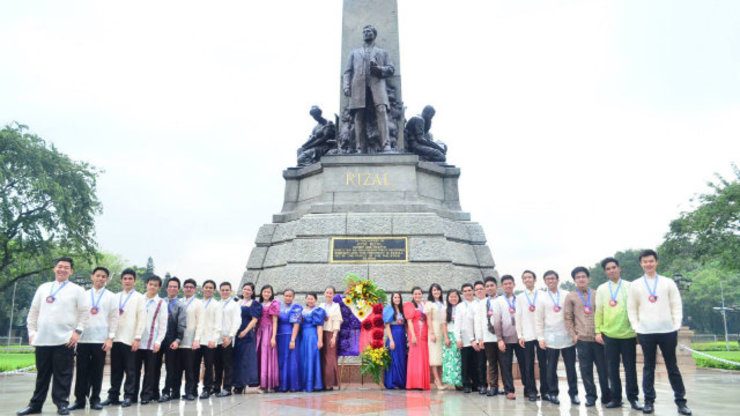SUMMARY
This is AI generated summarization, which may have errors. For context, always refer to the full article.

“Where are the youth who will consecrate their golden hours, their illusions, and their enthusiasm to the welfare of their native land?” Such were the words of Jose Rizal, in the persona of the patriotic priest Padre Florentino, in his novel El Filibusterismo.
Over 100 years have passed since these words were written, and yet the challenge to us, the Filipino youth, is as relevant as ever. As young adults on the quest of discovering who we are and who we are meant to be, the role of nation building has been firmly placed in our hands. Mentors from generations before have done their part in shaping the nation and are grooming us, the Filipino youth, to be the next change agents.
In our short stay here, we have witnessed the tragic effects of our nation’s most lamentable social ills: the orchestrated misuse of government funds, the systemic violation of basic human rights, and the continuous loss of life and property due to abandonment and greed.
Through all of these, it has become more and more apparent that our nation needs more Filipinos than citizens.

It is easy to imbibe “Filipino Pride” in our moments of triumph – with every win of Manny Pacquiao, every article on the Philippines as the projected thriving economy of the next decade, and every tourist video espousing the natural beauty of our motherland.
But being Filipino is much more than a celebration of our collective successes; it is also an inheritance of the not-so-beautiful aspects of this country: its culture of impunity, widespread poverty, and institutional corruption, among others.
As indigenous peoples’ rights advocate Lourie Victor says, “Being Filipino means accepting the beauty and the madness of this nation.” But more than just accepting its flaws, we are challenged to be the change we want to see in this nation, because we are indeed the future.
‘We are the future’
We are the future of this nation because, in the most literal sense, we will one day become the generation that leads this country. But we are also the future of this nation because our actions today will shape the course of tomorrow.
And although this has been said to us countless times by our parents, professors, and mentors (who were once also told this very same adage in their youth), allow me to emphasize that never has there been a more exciting time to be a member of the youth sector.
It has been said time and time again that there is something different with the circumstances surrounding our generation. We live in an era where our social impact is accelerated by the wealth of resources we have at our disposal.
In the age of the New Media and exponential technological advancements, we have the capacity to do more, reach more people, and act earlier – but the caveat is that we must use these resources responsibly.
And it is not only in the use of our resources that we must be responsible, but also in the expression of our idealism. Although our youth is marked by our idealism, let us temper our idealism with humility – in accepting the fact that we can only do so much, and that we cannot solve all the problems of our nation overnight.
Once we accept that we are individually limited, it will be much easier to move forward, with the understanding that in order to serve the nation, it is enough to do well in whatever we do, and trust that our fellow youth will do the same.
And once we accept that progress takes time, it will be much easier to move forward, with the understanding that nation building is a lifelong commitment, with its own ups and downs, that we share with like-minded fellows.
On leaving, staying
There will be times that it may indeed be tempting to simply leave and explore greener pastures overseas, but please stay because our nation needs us. Our nation needs our talents and skills, infectious idealism and irreverent refusal to accept social ills as all that is and all that will ever be.
But if we must go, wherever we go, let us take the dreams of our people with us and hold them with reverence.
After all, we are all allies in nation building. As an archipelagic country, it is easy to make the mistake of detaching ourselves from the people beyond our line of sight, and even easier, to relegate the experiences of our countrymen to something that is foreign to us because we were born under different circumstances.
But it is important to remember that we are all part of the same nation. And once we come to terms with this and really understand it, it becomes easier to act in ways that mirror the depth of human dignity, to deal with each other with empathy and compassion.
Let us do away with crab mentality, an approach that is not at all underlying in our native culture, but something we have acquired from our colonizers.
Let us foster, instead, our endemic sense of community, the spirit of bayanihan, in celebrating the successes of our countrymen. At the end of the day, the success of one, is the success of everyone. And we need all the good people that we can in order to change this nation for the better.
Perhaps out of equal parts frustration and hope, Jose Rizal asked: “Where are the youth who will consecrate their golden hours, their illusions, and their enthusiasm to the welfare of their native land?”
Fast forward over 100 years later, we, the Filipino youth of today, cry out: We are right here, on the cusp of greatness, brimming with idealism, and poised to make the Philippines a better place.
Mabuhay tayong lahat! – Rappler.com
Angela Teresa G. Sebastian is one of the recently awarded 2014 Ten Outstanding Students Philippines (TOSP). She serves as a head of Tulong sa Kapwa Kapatid, an organization that provides opportunities for educational growth to impoverished children in Payatas, Quezon City. This article is a culmination of the lessons she learned from the TOSP National Formation Programme from August 1-7.
Add a comment
How does this make you feel?
There are no comments yet. Add your comment to start the conversation.